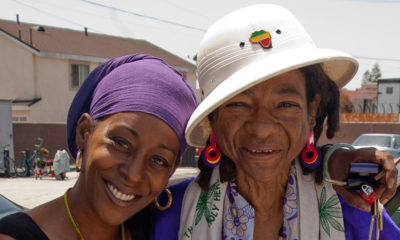
Joint Opinions
The 12 Days of Kushmas: 4 Calling Causes
The holiday season is a wonderful time to think about giving back to the community, so on the fourth day of Kushmas, my true love gave to me: four calling causes!
Moments before announcing the winners of California’s most prestigious cannabis award on Dec. 10, The Emerald Cup’s organizers offered an apology, and an explanation. One of the winners, Eden Farms’s Karl Witt, would be not present, they said. He wanted to be. As of that morning, he was going to be.
His absence wasn’t his fault: On the way to the cup, he was pulled over by police. He had his car tossed and his weed taken. He went home, where police showed up again. His Emerald Cup weekend began with a traffic stop, and ended with a raid.
Witt’s case is a reminder: Even though in many places — especially in the California of 2017, where voters legalized marijuana and have just days to wait for the first commercial over-the-counter sale of recreational cannabis in the state — it can feel as if the cannabis legalization movement has accomplished its goals, there still is far to go before cannabis advocates can hang up their hats. Despite the fact that at The Emerald Cup, nearly 30,000 people showed up to an organized cannabis party, smoked themselves insensible and bought and sold pounds in full view of bored police providing security, Witt’s case is proof positive that the drug war continues.
First, marijuana legalization isn’t nearly as popular as you think. Look at the polling, but look carefully: When ordinary, non-cannabis-using civilians are polled on the matter, they appear to actually prefer decriminalization, not a well-capitalized commercial cannabis industry — and often maintaining the status quo over some drastic change.
All this to say the era of the activist has not disappeared yet. Here are some noble causes worthy of your involvement now, and throughout 2018.
1) Help cannabis POWs, marijuana refugees and stigmatized rebels
Legalization allows former “offenders” to clean their records, but in most states, legalization has not freed prisoners serving time for marijuana-related offenses. Activists like Cheri Sicard have been busy advocating for prisoners like Luke Scarmazzo, who ran a medical marijuana dispensary in Modesto, California before running afoul of the feds, and Corvain Cooper, who’s currently serving a life sentence on money-laundering charges in North Carolina. These men’s crimes were nonviolent, and in Scarmazzo’s case, his “crimes” are now acceptable commercial activity. This holiday season, the advocacy group Parents 4 Pot is running its annual gift drive for the families of people incarcerated for cannabis crimes. The other 11 months of the year, Parents 4 Pot advocates for families forced to uproot themselves and move to green states to access medical cannabis.
2) Support legalization with ensured safe access for everyone
Cannabis policy reform doesn’t mean much if it’s an academic exercise in the realm of theory. New York State is a good example. New Yorkers legalized medical marijuana, but with a narrow list of qualifying conditions and doctors willing to write a recommendation, fewer than 40,000 New Yorkers have managed to enter the program. If you live in New York, you can call Gov. Andrew Cuomo’s office and remind him the National Academies of Sciences, Engineering, and Medicine accepts marijuana’s value in treating chronic pain. And chronic pain is endemic — having cannabis as an available option cuts back opiate use, significantly. In New York and in other states where cannabis isn’t readily available, Americans for Safe Access has been agitating for expanded research and eligible cannabis patients’ abilities to actually acquire cannabis since 2002.
3) Fight for an equitable industry
A few years ago, scanning the room and seeing the obvious 400-pound gorilla, one of the executives at a marijuana-industry conference tried to break the ice with a joke. “This is the most white and male convention you can go do,” he said. He was right, and he continues to be right: White men continue to dominate key positions in the cannabis space, to the point that lawmakers and activists say openly that the industry needs a Civil Rights Act in order to ensure that the fabulous profits are shared equitably. Gender and racial equality aren’t problems unique to the cannabis industry, of course, but more is expected from legal weed. Legalization has its roots in social justice. Remember: the drug war has been used as a political tool to break up communities of color. Drug felonies disenfranchise people from voting and sentence them to economic penury. If the legal marijuana industry fails to correct these wrongs, then it’s contributing to the problems — and it appears the industry won’t fix itself. Ask your local lawmakers what they’re doing to guarantee women and people of color have a say in cannabis. Work with Women Grow or outfits like Oakland’s Hood Incubator. If there’s not a chapter or an analogue in your town, start it. At the least, recognize how the end of the drug war can be the start of a marijuana industry civil-rights movement.
4) Be a responsible consumer: Support responsible producers, safe products and small business
Americans are living through an era where income inequality has reached levels comparable to Russia and worse that Rwanda. In order to reverse this trend, think about supporting farmer co-ops and small businesses. Make no mistake: It appears that marijuana monoliths are coming. For example, lawmakers in California were working on small-farmer protections, when large donations pushed the state to cut those protections from their temporary regulations. Buy from small producers. Ask about their practices before you purchase — if something doesn’t check out, if it’s not clean and they’re not transparent, take your money somewhere else.
Now is the time when the foundation we’ll rely on for years to come is being poured. You, the consumer, have more power than anyone to determine what kind of house we’re building, and who is invited inside.
TELL US, what cannabis causes do you support?























